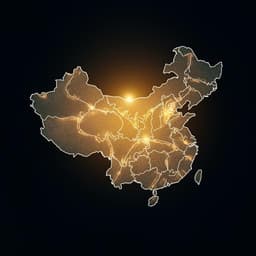
Business
CEO political connections and OFDI of Chinese firms under the Belt and Road Initiative
Y. Wang, S. Chen, et al.
The paper investigates why and how Chinese firms respond to the government-led Belt and Road Initiative (BRI) by expanding OFDI to BRI-participating countries. BRI is a geopolitical policy aimed at regional development and alleviating excess capacity through state-led investment. Prior studies on political connections and internationalization yield mixed results, often lacking attention to the geopolitical context and bilateral relations inherent in BRI. This study asks whether CEO political connections encourage firms to invest along the BRI routes and under what institutional conditions such effects are strengthened or weakened. It posits that CEOs with political ties can access policy information, resources, government support, and legitimacy that facilitate OFDI under BRI, and tests the moderating roles of institutional environments in both home regions and host countries.
The study builds on resource dependence theory and the resource-based view to frame firm–government relations as sources of critical resources. Prior research shows mixed effects of domestic political connections on OFDI: some suggest negative effects due to increased costs and ideological frictions, while others find positive effects when considering foreign ties and complementarity. The paper argues that context matters: under BRI, cooperation agreements imply favorable bilateral relations, potentially shifting the balance toward positive effects of domestic political ties. It also integrates institutional theory, proposing that robust formal institutions in home or host markets reduce reliance on informal ties (Guanxi) and diminish the marginal benefits of CEO political connections.
Data and sample: The authors compile panel data for Chinese A-share listed firms with OFDI in BRI countries from 2013–2021. Macroeconomic data on host countries and firm accounting/financial data come from CSMAR; CEO political connections are primarily from CSMAR augmented by manual collection; home-region institutional environment from Wind and the Marketization Index of China; host-country institutional environment from the World Bank’s Worldwide Governance Indicators (WGI). Exclusions: subsidiaries in tax havens (e.g., Cayman, Bermuda), ST/*ST firms, financial industry firms, firms exiting overseas subsidiaries in the research year, and observations with missing values. Final sample: 3,226 firm–host country–year observations.
Measures: Dependent variable—Scale of OFDI under BRI measured by the number of overseas subsidiaries in a single host country. Independent variable—CEO political connections (Politics), a dummy equal to 1 if the CEO currently or previously served as a government secretary or was a National People’s Congress (NPC) or Chinese People’s Political Consultative Conference (CPPCC) member; 0 otherwise. Moderators—Home-region institutional environment (Marketization Index at the provincial level; higher values indicate better institutions) and host-country institutional environment (WGI, averaged across six governance dimensions; higher values indicate better institutions). Controls—Host-country macro factors (GDP per capita, GDP growth, Gini coefficient, population density, CPI; logs) and firm characteristics (size, adjusted ROA, Tobin’s Q, book-to-market, net profit growth, patent stock (log), ownership concentration, separation ratio, R&D employee ratio), plus industry and year fixed effects.
Estimation: Given the nonnegative, integer, over-dispersed dependent variable, the study uses negative binomial regressions. Core models estimate the main effect of Politics on OFDI scale and interactions with Marketization (home) and WGI (host). The specification includes industry and year fixed effects. Robust standard errors are reported.
Robustness checks: (1) One-year lag of Politics; (2) instrumental variable approach using industry-level average CEO political connections as an instrument; (3) dropping 2020 (pandemic) observations; (4) adding strategic and competitive factors (multinational scope, bank loans, BRI key provinces and industries, host export, trade flows, trade openness). Further analysis splits the sample into central state-owned vs. non-central state-owned firms to examine substitution between state ownership and CEO political ties.
- Descriptive statistics: Mean OFDI scale (number of subsidiaries per firm–host-year) is 1.280. Mean Politics (CEO has ties) is 0.144, indicating most CEOs lack political connections.
- Main effect: CEO political connections positively relate to OFDI scale under BRI. In Model 2, Politics coefficient b=0.0820 (p=0.023); in the full model (Model 5), b=0.0948 (p<0.01).
- Institutional moderators: Home-region institutional environment weakens the positive effect of Politics on OFDI scale. Politics × Marketization is negative and significant (Model 3: b=−0.1311, p<0.01; Model 5: b=−0.1395, p<0.01). Host-country institutional environment similarly weakens the Politics effect. Politics × WGI is negative and significant (Model 4: b=−0.1465, p<0.001; Model 5: b=−0.1637, p<0.001). Graphical interactions (Figs. 2–3) illustrate these patterns.
- Other covariates: Marketization and WGI exhibit positive main effects on OFDI scale; several firm and country controls show expected signs (e.g., larger size and higher Gini associated with higher OFDI scale; higher patent stock and R&D employee ratios associated with lower OFDI scale).
- Robustness: Results hold with lagged Politics, IV estimation (first-stage instrument strong; industry politic mean positively predicts firm Politics), dropping 2020, and adding strategic/competitive controls.
- Further analysis by ownership: For non-central-state-owned firms, Politics has a positive effect on OFDI scale (e.g., b≈0.0845, p<0.10), and both institutional moderators remain significantly negative (home b≈−0.1479, p<0.01; host b≈−0.1842, p<0.001). For central state-owned firms, Politics is not significantly related to OFDI scale, indicating central state ownership substitutes for CEO political connections.
The findings indicate that CEO political connections provide access to policy-related information, financing, government support, and legitimacy, which reduce transaction costs and political risks for OFDI under BRI. In the BRI context—where bilateral political relations are favorable—domestic political ties enhance firms’ ability to identify and exploit opportunities aligned with BRI priorities (e.g., infrastructure, policy coordination, financial integration). However, when either the home-region or host-country institutional environment is strong and market-supportive, formal rules and impartial enforcement reduce the marginal value of informal political ties, diminishing their impact on OFDI scale. The null effect among central state-owned firms suggests that state ownership can provide political resource access akin to, or substituting for, CEO-level connections. These results clarify mixed prior findings by showing that geopolitical policy context and institutional quality are key contingencies for the efficacy of political connections in internationalization.
This study shows that CEO political connections significantly promote the scale of Chinese firms’ OFDI under the Belt and Road Initiative. Yet, their positive effect is weakened by stronger institutional environments in both the home region and host country, and is largely unnecessary among central state-owned firms where state ownership substitutes for CEO ties. The paper contributes to research on OFDI under geopolitical policy, integrates non-market strategy considerations into analyses of international expansion, and highlights institutional contingencies shaping the value of political connections.
- Scope of political ties: The analysis focuses on CEO political connections within the home country and does not deeply incorporate dynamic political-economic shifts among specific BRI members.
- Omitted factors: Despite extensive controls, other relevant determinants (e.g., host entity absorptive capacity, industry competitive intensity in the host) merit examination.
- Agency concerns: CEO political ties are personal resources; potential misalignment with shareholder interests (agency costs) is not directly tested.
- Negative aspects of connections: Potential adverse channels (lobbying, campaign contributions, bribery) are not modeled due to data limitations; future work could explore these mechanisms with alternative designs.
Related Publications
Explore these studies to deepen your understanding of the subject.







